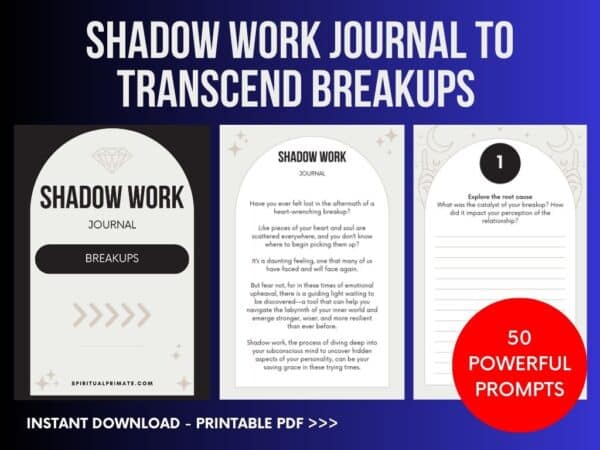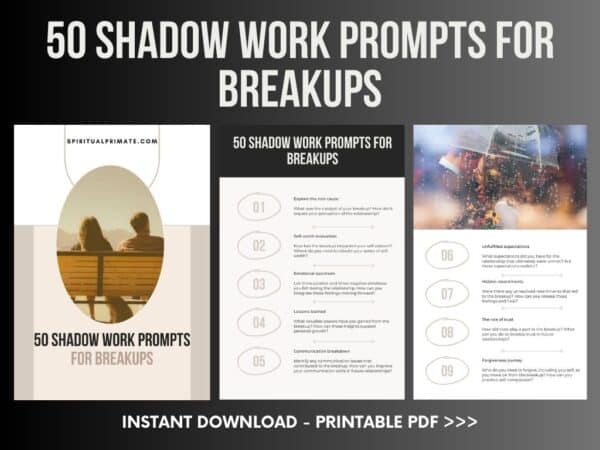Have you ever felt lost in the aftermath of a heart-wrenching breakup? Like pieces of your heart and soul are scattered everywhere, and you don’t know where to begin picking them up?
It’s a daunting feeling, one that many of us have faced and will face again. But fear not, for in these times of emotional upheaval, there is a guiding light waiting to be discovered—a tool that can help you navigate the labyrinth of your inner world and emerge stronger, wiser, and more resilient than ever before.
Shadow work, the process of diving deep into your subconscious mind to uncover hidden aspects of your personality, can be your saving grace in these trying times. So, are you ready to embark on a transformative journey of self-discovery and healing? Will you dare to face your shadows and transcend your breakup with these 50 soul-stirring prompts?

Breakups: Understanding the End of a Relationship
A breakup is the ending of a romantic relationship between two people. It is a significant life event that is often accompanied by a mix of emotions, including sadness, anger, confusion, and sometimes even relief. Breakups can occur for various reasons, such as growing apart, unresolvable conflicts, infidelity, or a change in personal goals or priorities.
The process of going through a breakup can be challenging, as it involves adjusting to life without the person you were once intimately connected with. This change can affect many aspects of your life, including your daily routines, social circles, and even your sense of identity.
It is essential to acknowledge that breakups are a natural part of life and that people grow and change over time. In many cases, this growth can lead to a realization that the relationship is no longer compatible or fulfilling. While breakups can be painful, they can also serve as a catalyst for personal growth and self-discovery, ultimately leading to stronger and healthier relationships in the future.
In summary, breakups are the end of a romantic relationship and can be a difficult yet transformative experience. It’s essential to remember that, like all life experiences, breakups can teach us valuable lessons and help us grow as individuals.

Healing from Breakups: The Power of Shadow Work
Breakups can be an emotionally challenging experience, leading to a mix of emotions such as sadness, anger, and confusion. However, they can also provide an opportunity for personal growth and self-discovery. One effective approach to dealing with breakups is by engaging in shadow work, a psychological process that involves exploring and integrating the hidden or unacknowledged aspects of oneself. This article will discuss how shadow work can help you heal from a breakup and emerge as a stronger, more self-aware individual.
What is Shadow Work?
Shadow work is a concept that originated from the theories of Swiss psychiatrist Carl Jung. According to Jung, the “shadow” represents the repressed, unconscious aspects of ourselves that we may not be comfortable acknowledging or expressing. These can include our fears, insecurities, and negative emotions. Through shadow work, we delve into these hidden aspects of our psyche and bring them to the surface, allowing us to confront and integrate them into our conscious awareness.
How Shadow Work Helps in Dealing with Breakups
1. Emotional Awareness and Acceptance
One of the most challenging aspects of a breakup is processing the intense emotions that accompany it. Shadow work encourages you to become more aware of your feelings and accept them without judgment. By acknowledging and embracing your emotions, you can begin to process and learn from them, ultimately fostering emotional resilience.
2. Identifying and Addressing Unconscious Patterns
Breakups often reveal unconscious patterns in our behavior and thought processes. Shadow work helps you recognize these patterns and explore the root causes behind them. By understanding and addressing these underlying issues, you can break free from unproductive habits and create healthier relationships in the future.
3. Strengthening Self-Identity
A breakup can lead to a crisis of self-identity, as we often define ourselves in terms of our relationships. Shadow work helps you reclaim your sense of self by integrating previously unacknowledged aspects of your personality. By developing a deeper understanding of who you are, you become more resilient and less reliant on external validation.
4. Enhancing Personal Growth
Shadow work encourages self-reflection and introspection, which can lead to personal growth and development. As you explore your inner world and confront your shadows, you gain valuable insights and learn important lessons about yourself. This newfound self-awareness can empower you to make better choices and cultivate healthier relationships moving forward.
5. Forgiving Yourself and Others
The process of shadow work can help you cultivate forgiveness, both for yourself and your ex-partner. By examining your shadows and recognizing your own imperfections, you can develop a greater sense of compassion and empathy. This understanding can help you let go of resentment and anger, allowing you to move on from the relationship with a lighter heart.
While breakups can be painful, they also present an opportunity for growth and self-discovery. Shadow work offers a powerful tool for healing and personal transformation, enabling you to confront the hidden aspects of yourself and emerge as a stronger, more self-aware individual. By engaging in shadow work, you can learn valuable lessons from your breakup and cultivate a healthier, more fulfilling path forward.

Shadow Work Prompts for Breakups
1. Explore the root cause: What was the catalyst of your breakup? How did it impact your perception of the relationship?
2. Self-worth evaluation: How has the breakup impacted your self-esteem? Where do you need to rebuild your sense of self-worth?
3. Emotional spectrum: List three positive and three negative emotions you felt during the relationship. How can you integrate these feelings moving forward?
4. Lessons learned: What valuable lessons have you gained from the breakup? How can these insights support personal growth?
5. Communication breakdown: Identify any communication issues that contributed to the breakup. How can you improve your communication skills in future relationships?
6. Unfulfilled expectations: What expectations did you have for the relationship that ultimately went unmet? Are these expectations realistic?
7. Hidden resentments: Were there any unresolved resentments that led to the breakup? How can you release these feelings and heal?
8. The role of trust: How did trust play a part in the breakup? What can you do to develop trust in future relationships?
9. Forgiveness journey: Who do you need to forgive, including yourself, as you move on from the breakup? How can you practice self-compassion?
10. Patterns and cycles: Are there any recurring patterns in your relationships that contributed to the breakup? How can you break these cycles?
11. Emotional triggers: What emotional triggers were activated during the breakup? How can you respond to them in healthier ways?
12. Boundaries and limits: Were your boundaries respected in the relationship? How can you establish and maintain healthy boundaries in the future?
13. Unspoken fears: What fears did you have during the relationship that went unaddressed? How can you confront these fears moving forward?
14. Lost dreams: What dreams or aspirations did you let go of during the relationship? How can you reclaim them now?
15. The role of vulnerability: How comfortable were you with being vulnerable in the relationship? How can you cultivate vulnerability in future connections?
16. Emotional baggage: What emotional baggage from previous relationships did you bring into this one? How can you release this baggage and start anew?
17. The power of gratitude: What aspects of the relationship are you grateful for? How can you cultivate gratitude in your life moving forward?
18. Self-reflection: In what ways did you contribute to the breakup? How can you take responsibility for your actions and grow from them?
19. Redefining love: How has your definition of love changed since the breakup? What does a healthy and fulfilling relationship look like to you now?
20. The importance of self-care: How can you prioritize self-care as you heal from the breakup? What self-care practices resonate with you?
21. Inner-child healing: How can you nurture and support your inner child as you process the breakup?
22. The impact of external factors: Did external factors, such as family, friends, or career, contribute to the breakup? How can you navigate these factors in future relationships?
23. Emotional expression: How did you express your emotions during the relationship? How can you improve your emotional expression in the future?
24. Letting go of control: In what ways did you try to control the relationship? How can you practice letting go of control in future connections?
25. The art of compromise: Were you able to find a balance between your needs and your partner’s needs? How can you cultivate compromise in future relationships?
26. The role of change: How did personal growth or change contribute to the breakup? How can you embrace change moving forward?
27. Attachment styles: What is your attachment style, and how did it impact the relationship? How can you develop a secure attachment style?
28. Emotional availability: Were you emotionally available during the relationship? How can you improve your emotional availability in the future?
29. Self-discovery: What have you learned about yourself since the breakup? How can you use this knowledge to grow and evolve?
30. The power of presence: How present were you in the relationship? How can you cultivate mindfulness and presence in future connections?
31. The role of validation: Did you seek external validation in the relationship? How can you practice self-validation moving forward?
32. The impact of codependency: Were there any codependent tendencies in the relationship? How can you develop healthier interdependence in the future?
33. Rebuilding self-identity: How has your sense of self changed since the breakup? How can you redefine your identity outside of the relationship?
34. Emotional resilience: In what ways can you build emotional resilience as you heal from the breakup?
35. The importance of balance: How can you maintain a balance between your personal life and romantic relationships moving forward?
36. Releasing guilt: How can you let go of any guilt related to the breakup and forgive yourself?
37. The impact of social media: Did social media play a role in the breakup? How can you use social media mindfully in future relationships?
38. The power of introspection: How can you use introspection to gain insight into your feelings, thoughts, and behaviors related to the breakup?
39. The role of personal values: How did your personal values align or clash with your partner’s? How can you ensure compatibility in future relationships?
40. Emotional intelligence: How can you develop emotional intelligence to create deeper connections in the future?
41. The art of listening: Were you an active listener in the relationship? How can you sharpen your listening skills for future connections?
42. The impact of assumptions: Did making assumptions contribute to the breakup? How can you practice open-mindedness and curiosity in future relationships?
43. The role of authenticity: Were you authentic in the relationship? How can you embrace your true self in future connections?
44. The power of adaptability: How can you become more adaptable and open to change in future relationships?
45. The impact of past traumas: Did unresolved traumas affect the relationship? How can you heal and integrate these experiences moving forward?
46. The importance of mutual support: How can you cultivate an environment of mutual support and encouragement in future connections?
47. The role of personal growth: How can you prioritize personal growth and self-improvement as you move on from the breakup?
48. The impact of time: How can you practice patience and give yourself time to heal and grow after the breakup?
49. The power of perspective: How can you reframe the breakup as an opportunity for growth and self-discovery?
50. The art of acceptance: How can you practice acceptance and surrender as you heal from the breakup and move forward in your life?
As you reflect on the 50 shadow work prompts and the emotional resilience you’ve gained, remember that healing is a journey, not a destination. You are more than your past relationships, and by embracing the power of shadow work, you’ve taken a significant step toward rebuilding your inner strength and self-identity.
Through this process, you’ve dared to delve deep into your soul, confront your fears and insecurities, and emerge with newfound wisdom and clarity.
So now, as you continue on your path to becoming the best version of yourself, ask yourself: What other shadows lie hidden within me, waiting to be embraced and transformed into sources of strength and growth?
Dive Deeper Into Your Shadow Work Journey
- Product on sale
 Printable Shadow Work Journal to Transcend Breakups [PDF]Original price was: $11.98.$5.99Current price is: $5.99.
Printable Shadow Work Journal to Transcend Breakups [PDF]Original price was: $11.98.$5.99Current price is: $5.99. - Product on sale
 50 Shadow Work Prompts for Breakups | Printable PDFOriginal price was: $5.98.$2.99Current price is: $2.99.
50 Shadow Work Prompts for Breakups | Printable PDFOriginal price was: $5.98.$2.99Current price is: $2.99.

